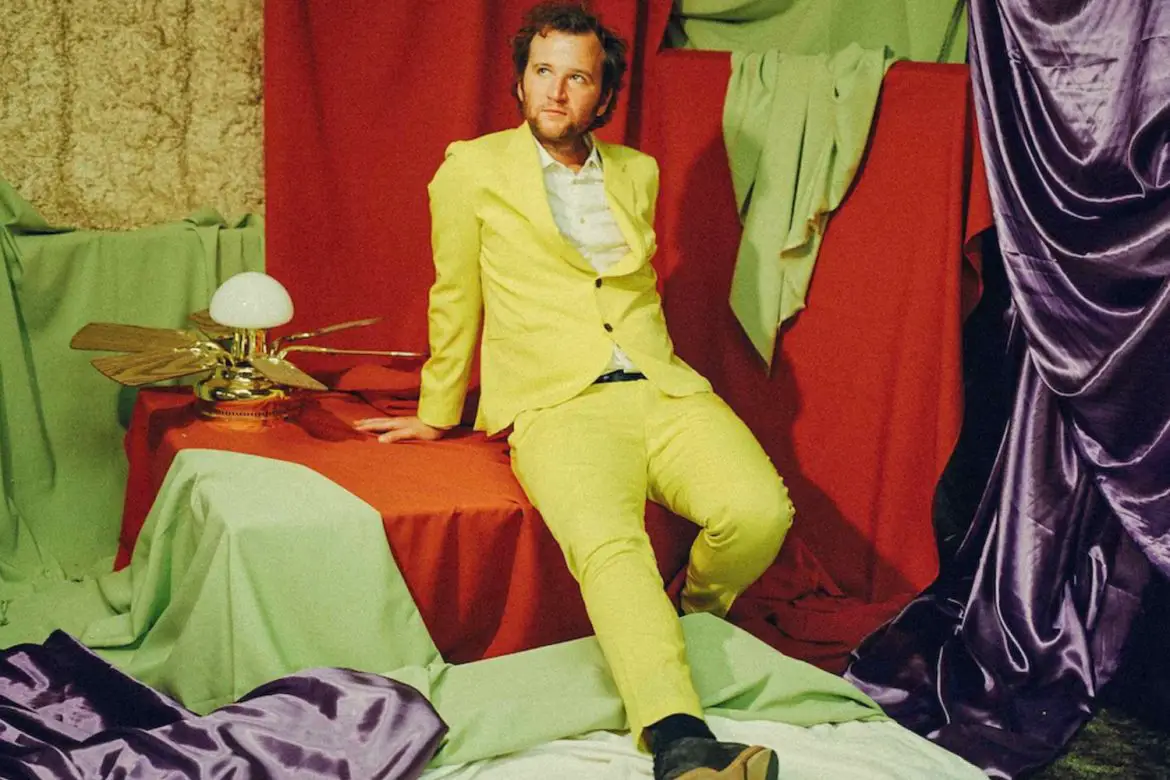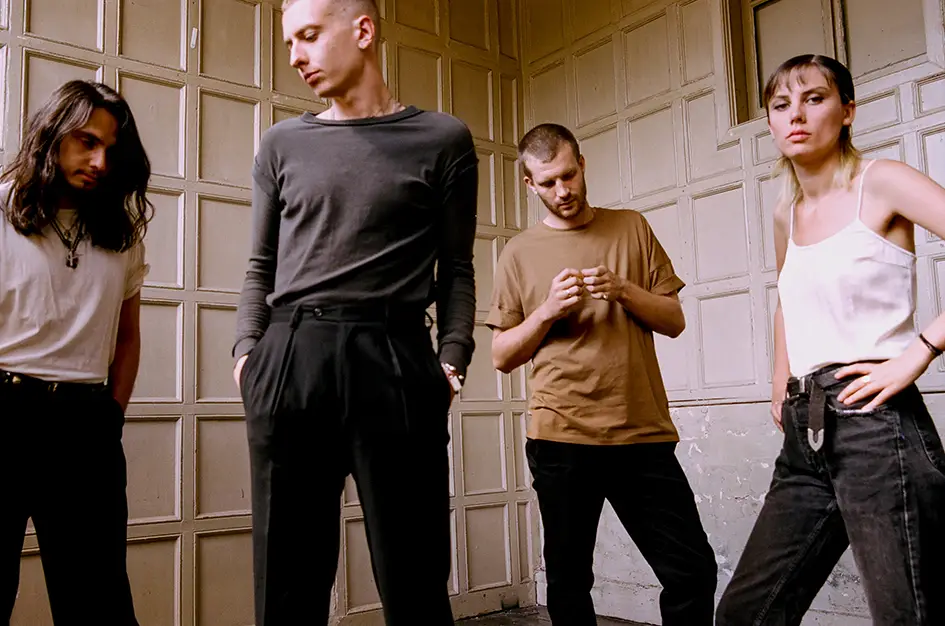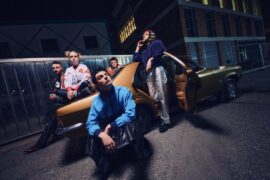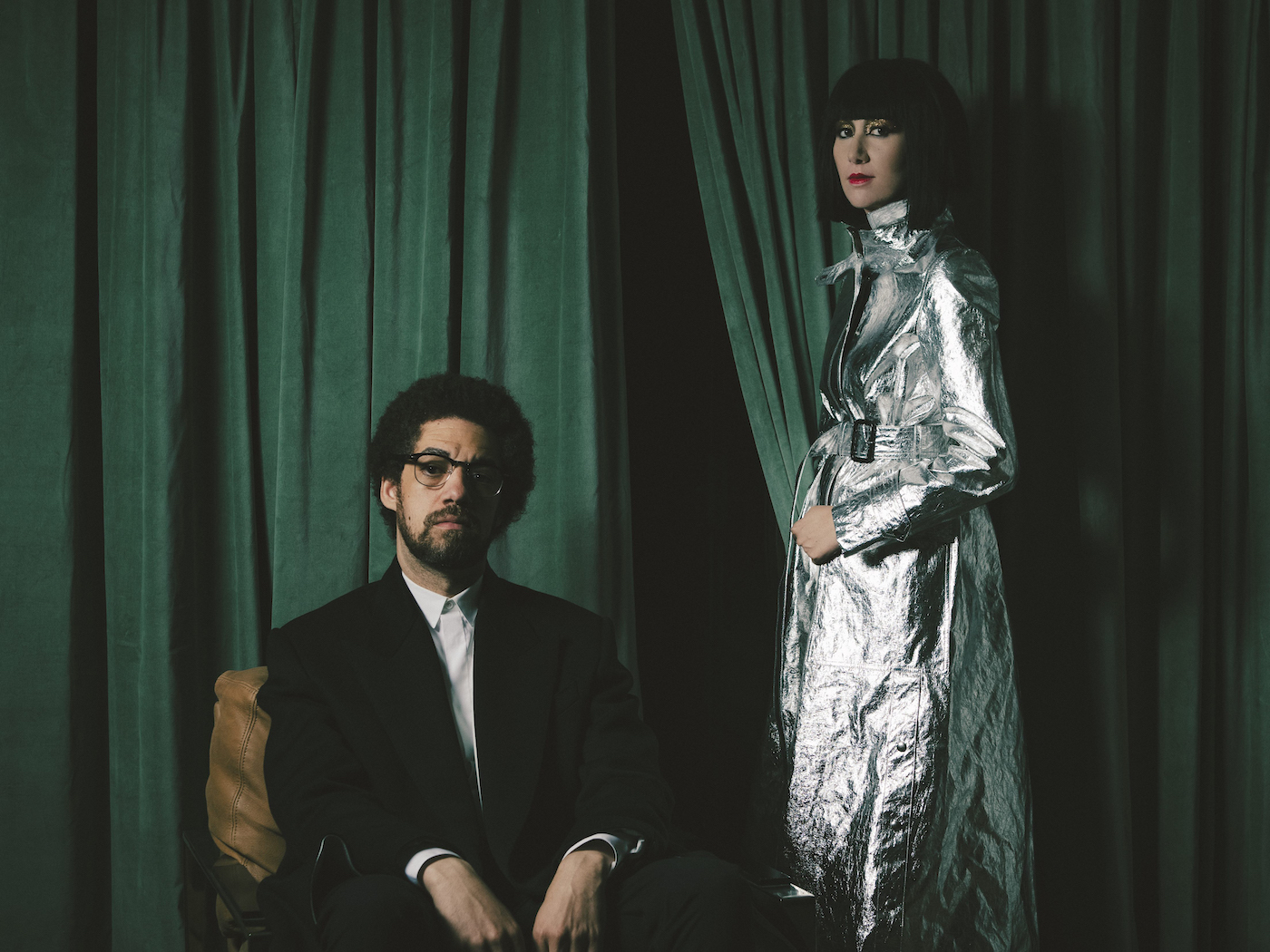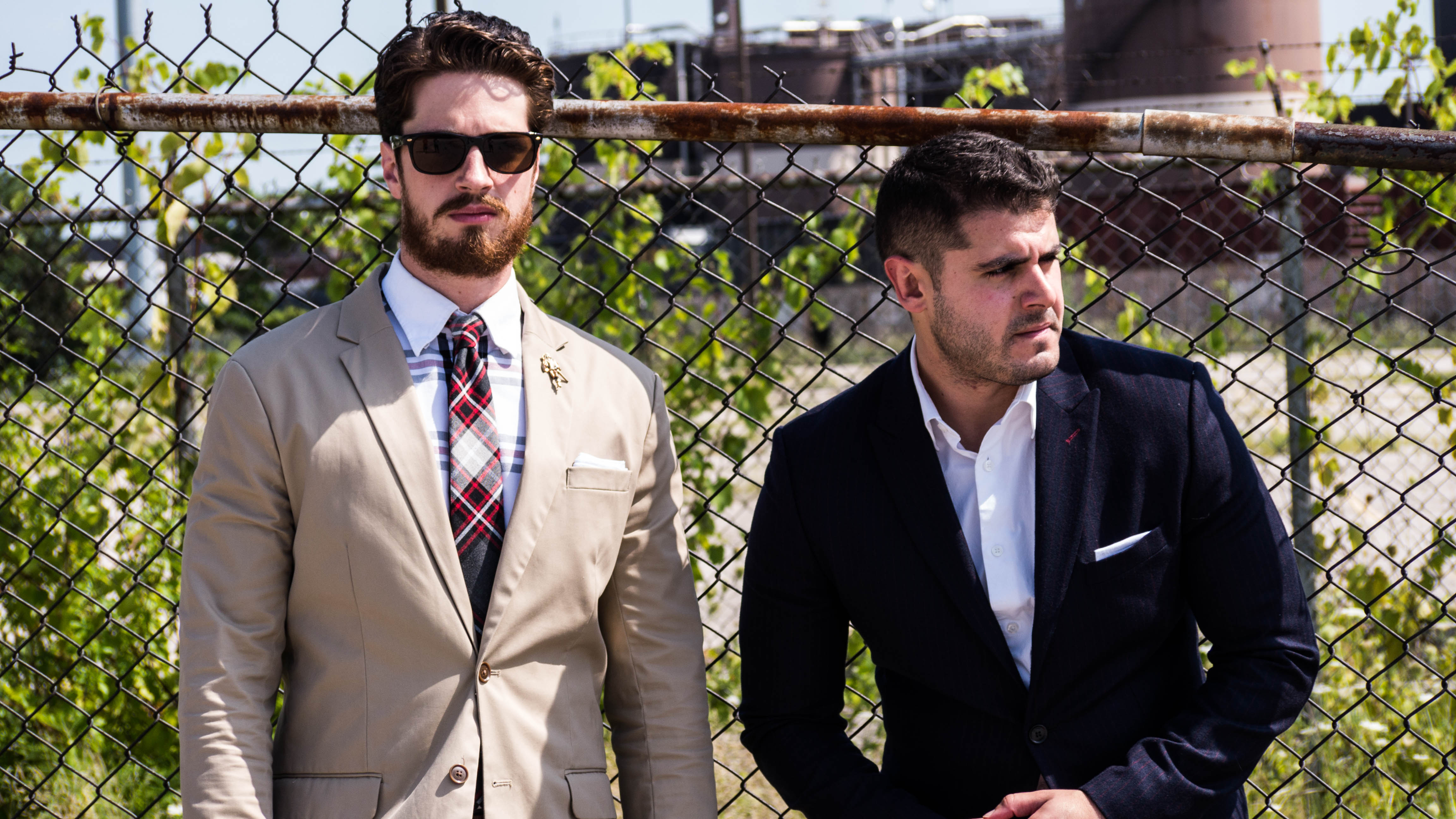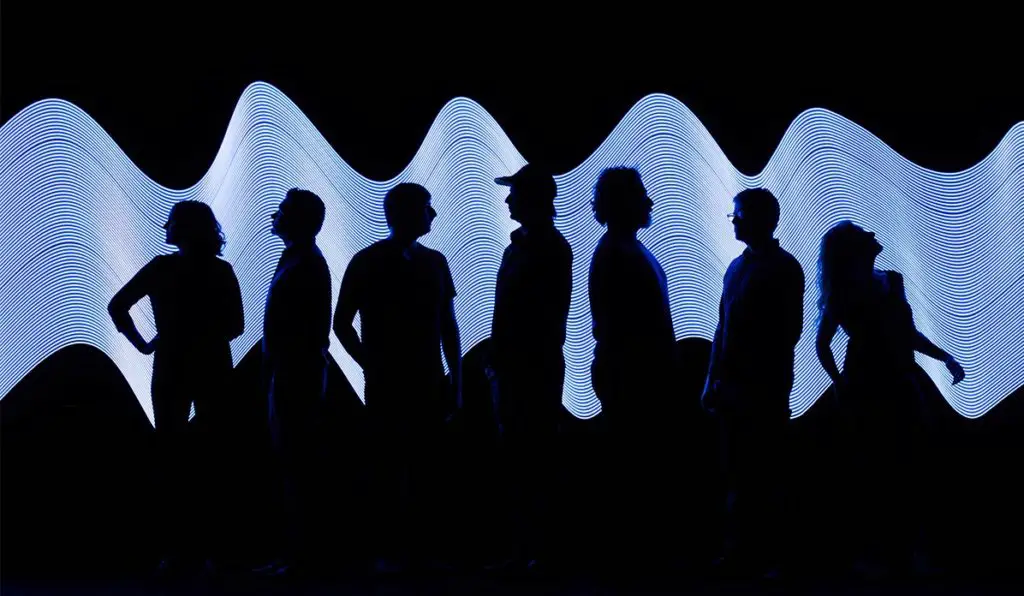Vampire Weekend bassist Chris Baio gives an insight into his latest solo album ‘Dead Hand Control,’ growing as an artist, and having fun with songwriting.
•• ••
Stream: ‘Dead Hand Control’ – Baio
I think it’s a hopeful romantic record ultimately. I hope that it happens to be timed with a kinder era, and a safer era too!
Like all art, often music is just a form of lighthearted relief, whether it’s an approach to the creation or the optimism dispersed with the sound. Even if the subject matters address the dreary or come from negative observations, turning it into something uplifting reminds us that the world isn’t entirely harsh. Dead Hand Control, the latest album by Baio (released 29 January), has many moments like this, with the melodies lively, the synths sparkly, and the beats contagiously hyperactive.

The opening track (and title track), encompasses it well. The jingling strums prance with the vocals, the chorus short and snappy, before a pause in the song makes way for an energized beat-heavy instrumental. In “Take It From Me” a Talking Heads style groove sets the pace throughout, while words of reassurance are sung- For example, ‘If you’re looking for a friend/ In uncertain times/ If you need a hand/ Well I’d love to give you mine’ and ‘When I saw you standing there/ With the tears in your eyes/ I know what you felt/ I’m a sensitive guy.’ As Baio tells Atwood Magazine, “There are all these things that happen in the world on a global level that I as an individual have absolutely no control over but what I can control is how I am to my family, how I am to the people in my life, how I am to the community.”
I’ve been thinking about the end times
About the mad men and their bombs
You can’t stave death off forever
But you can sing a simple song
Dead Hand Control
You can take my life but you will never take my soul
Dead Hand Control
You can take my life but you will never take never take my soul
Never take my soul
– “Dead Hand Control,” Baio
Other songs follow this notion of togetherness or projecting a personality that’s filled with softness. “Endless Me, Endlessly”, synth-lead and slightly 80s, is about selflessness, the opening lines being ‘If you’re feeling like you don’t belong/ If you’re feeling like they got you wrong/ If you’re feeling like you can’t be strong/ In a place that’s not your scene / If you’re feeling like you need a friend/ Let him be me.’ In “What Do You Say When I’m Not There”, a desire for love dominates and instigates the kind of innocent hopelessness that comes with a youthful crush and “O.M.W,” the slowest, calmest on the album (and written by Ezra Koenig) is like a love poem delivered over twinkling keys and dreamy instrumental.

Chris Baio is best known as the bassist of Vampire Weekend but, while Dead Hand Control carries some of the melodic playfulness distinct to the band, this is very much Baio pursing his own route.
Baritone vocals are exaggerated, influences are embraced, and the album’s concept stems from a personal reaction to things. Like how his previous album, 2017’s Man of the World, was made as a response to Brexit and Trump’s presidency, Dead Hand Control was born from observations of American life and pondering over topics such as nuclear war and death. The middle track “Dead Hand” perhaps best sonically emphasizes this with the electronics more intense, pulsing with an anxiousness, but there’s also a sweetness and a harmlessness that comes to define the feel of the record. Overall the gloom and the terror is disguised by the encouragement to smile, dance, and keep yourself close to the ones you love.
Atwood Magazine caught up with Baio (the interview taking place on the release date of “Take It From Me” and “Dead Hand Control” which were the final lead up the album) to discover more about his solo projects and how Dead Hand Control is an evolution in his approach to music.
Watch: “Endless Me, Endlessly” – Baio
A CONVERSATION WITH BAIO

Atwood Magazine: Hey, how are you doing?!
Baio: I’m good! I’m good. I had two more songs from the album come out today, the title track and “Take It From Me”. I always like putting songs out to the world and those would have been two songs that I worked on for a very long time. To put it out and have some people listening to it is always a good feeling as far as I’m concerned so I’m happy today.
Amazing! Yeah I’ve been listening to the album and it’s good, I love it.
Baio: Aww thank you, Frankie. I really appreciate that.
My pleasure! Obviously this interview is all about you and not Vampire Weekend but I think for readers not familiar then it’s a good place to begin. Could you talk about how your solo work differs. For example, what mindset do you have when making the songs and what do you hope to convey to listeners?
Baio: Yeah absolutely. It’s kind of a long story but I’ll tell it in a shortest version as possible. I’m very lucky to have played bass in the band Vampire Weekend and that band obviously started when I was in college. I would have been 23 years old when our first record came out and we started touring and travelling the world and getting to play music wherever people would have us. It was a dream come true but at a certain point I kind of got a little bit frustrated because I was having all these musical ideas and things that I wanted to pursue and I didn’t know the first thing about recording. I didn’t know how to record a sound, make it sound cool, and turn it into something I liked and then be comfortable enough to put it out to the world. So I was at that point of being a successful bass player but maybe a frustrated producer.
After I got home from touring our second record Contra, I started taking music production classes and kind of just learning how to make something that sounded good to my ears. It was a very long process but eventually I started making songs and I finished three and I was really proud of them. I put out my first EP and it was of electronic and house music called Sunburn and then another two of instrumental dance music. At that point I would say I was happy producer but a frustrated singer and songwriter. I got to a place where I knew how to make an instrumental piece of music that I liked but I didn’t know how to do something with my voice. I started experimenting with singing and my voice and that took about another 18 months or so. It ended up becoming my first record which was called The Names which came out about 5 years ago.
So where I come from, I like to make records where anything can happen. You can have these long periods with instrumental techno and then have it go right into a short little pop song with guitar, bass, and drums. I think of albums when I make them as these kinds of journeys and one long piece of music. I would say definitely the sounds and influences are pretty different from that of Vampire Weekend but I do think there is a connection at the very least of often trying to write hooky memorable music with my solo records.

Your vocals are great because they’re so deep and then counterbalanced with the lively optimistic synths which sometimes feels very 80s. Is this the intension? How much does nostalgia play a part in your music?
Baio: Yeah it’s interesting because when I work on music I’m not thinking necessarily about any one decade or any one time and place for the most part. As I’ve gotten older I’ve found what parts of my voice I personally like and that when I make a record the thing I ultimately have control over is whether or not I like the music and whether or not I can make something that I’m excited about. Just listening to my voice, I’ve now made 3 albums with my singing on and I realized that I really like the deep part of my voice best. This was the first time where I made a record where I thought about what key to be in and what notes I was singing. My goal next time is to be able to sing a high note deeply. Because now I’ve realized I am able to sing deep notes in a way that I like but to sing a high note deeply that’s the next frontier for me. But I know deep baritone vocals are immediately evocative of the 80s and so much of my favourite music is from then. So you’re definitely very apt to draw that connection.
What does your songwriting process tend to be like? Do the melodies and atmosphere come first or the lyrics?
Baio: I work on songs in four different ways. One will be that I make a beat on the computer, another way I’ll write a song on piano and another will be on guitar. Or, alternatively, I’ll start with a song title. This record is a version of each of that but by far I was starting with song titles. Four of the songs, maybe even five, started with titles. What will happen is I’ll read about something or a turn of phrase will pop into my head and I find it a very useful exercise. For example, the turn of phrase ‘endless me, endlessly’ just popped into my head and I wasn’t actively searching for a song or trying to write a song but I just heard it and it stayed with me. It’s a very simple rhyme and idea but I think you read that title and it says so much. It constitutes wanting to communicate, wanting to be there for someone else in every possible way, as like an endless version of yourself. So I imagined what a song called “Endless me, endlessly” would sound like and then I started working on the rest. I just find that working that way is so much fun because if you have an idea for a song and you have words then you can imagine what those words sound like and that’s one of the most exciting ways to work on music.
There’s another song on the record, “Caisse Noire”. I was living in London for several years and I had a French friend who was talking about someone in her life who had a caisse noir and I said ‘well what’s a caisse noire?’ because that would sound like a black box. And she told me no caisse noire means like a slush fund, it’s like this hidden elicit money in French. And I just love the idea of this black box that’s associated with a thing that survives a plane crash in the French language meaning hidden and elicit money. So I filed that away, I was having dinner with my friend when she told me that, and I was like alright I know I want to make a song called “Caisse Noire” What does that sound like? What is the world of that?
That’s kind of how I start because it should be fun when you’re working on music, it should be an adventure, and it should feel like you’re creating your own world. So I think that moving forward I will keep writing songs that way the most because language is such a big part of music but to have it so language driven and then have this world that music fills in is a way that love working.

That’s so fun! I think if I was a musician then I’d definitely take that approach sometimes because it just seems like a really great creative exercise.
I know Dead Hand Control stemmed from you, to quote the press release, ‘looking at the past five years of American life and obsessing about topics like death, wills and nuclear war but at its heart, it’s about how the only thing you can control is the way you treat the people in your life’ so were there any distinct sonic elements that you wanted to include that kind of represent that? Like how much does the sound represent the names of the song titles?
Baio: Yeah so I was imagining what it would be like to live through an extreme situation. I had read about the concept of dead hand, this idea of writing in a will, giving your stuff to someone else and trying to control them after you die and I was very taken by that idea, I found it very fascinating. I had also known about a nuclear system that was also rumoured in the soviet union called dead hand that if it detected a nuclear attack it would automatically nuke America. Its very possible that that nuclear system still exists in modern Russia. So I was imagining what would it be like to survive a nuclear attack, for example. I just realized that there are all these things that happen in the world on a global level that I as an individual have absolutely no control over but what I can control is how I am to my family, how I am to the people in my life, how I am to the community.
Thinking through all that, I wanted the record to be my most abrasive sounding record. I wanted it to sound aggressive, like bombs going off. I’m a huge fan, because we’re talking of bombs, of The Bomb Squad- The Public Enemy production- and I thought about that music when making it. In the opening track, “Dead Hand Control’, the drums are crazy- really bombastic sounding. The song is about that nuclear system and I wanted it to have this huge banging techno sound that felt like bombs were going off over the course of it sonically. Yet at the same time I wanted it to be my most romantic record. I just thought about it as this record with more militaristic sounding, more abrasive sounding first half and then the second half being the romance, being there for people and showing up.
It’s fascinating that you mention such negative, apocalyptic things like the bombs but they’re delivered in a way that’s really harmless and nice rather than super gloomy. It’s not something you perhaps realize the first time listening.
One thing I was going to ask is how much of the songs are made by you and to what extent you’re in control of all the instrumentation, but you kind of touched on this earlier with learning to produce.
Baio: Yeah so I sing every song and I produce every track. I wrote every song apart from the last one, “O.M.W” which I wrote with Ezra [Koenig]. It was a song that we started 9 years ago now with him writing the the chorus to it. This is the most collaborative record I’ve made though. There’s this guy George Hume from London who plays guitar with me live whenever I’ve done solo tours and plays guitar on half the records. Greta Morgan who sings live in Vampire Weekend and tours with us, she sings all the back up vocals with singer Buzzy Lee. Then my friend Robbie Sinclair who I met from living in LA, he plays drums on the record. So they come in and they play and I produce them and I worked with John Foyle who’s an engineer and vocal production and I always record with him. For this record I got to do it in London at Daman Albarn’s studio which was very very exciting for me. It’s collaborative but most of the time it is me alone in my room when I’m working on the music.
Yeah I understand part of the record was recorded at Damon Albarn’s 13 Studios in London. When was this? Last year? The year before?
Baio: I recorded almost all of the vocals over the course of three days in London in 2019 and when I did that first session at Damon Albarn’s studio it was just absolutely incredible. It was just me and John getting to work in Damon’s studio for a few days. He is an icon and an idol for me, I absolutely love his music, so to get to play with all his toys is something I never thought I’d have the opportunity to do in my life.
So I would have recorded all the vocals and all the piano then and then I would have taken it back to LA and that was when I would have recorded Robbie playing drums and Greta and Buzzy Lee singing. Then back in November (2019) when I was on tour in Europe with vampire weekend, I’d take a train down to London to visit the studio then go back and meet the band again when having a day off.
It was in January of last year when it was all completed. I’ve been sitting on it for a year which is why I guess I’m in such a good mood today because new songs got to come out from it.

Sweet. Before the prep for this, I didn’t know you had a recording studio with Chris Tomson. That’s really cool! Could you give a little more insight into it. Have you recorded much else there and when did you decide to create it?
Baio: Yeah, it was very very lucky and happenstance. Near the area of Los Angeles where I live, a friend of mine was telling me that a friend runs a music shop called Uniform Music, a friend named Eric Bailey who was a guitar tech for vampire weekend like twelve years ago. But he opened a shop in los angeles. Are you familiar by any chance with the producer Mario C?
No, enlighten me!
Baio: He produced a lot of the Beastie Boys music and Jack Johnson and stuff like that. But I wasn’t actively looking for space necessarily. I was thinking about it because I’ve always just worked from home but been the kind of person who always likes to get out of their house and be in a different place when they work. My friend Eric said Mario’s empty studio is getting opened and you can have the space if you want. They asked if I wanted to take over the lease and we’ve been building it up for the past two and a half years now and yeah I would love to do more stuff in it. This record is the first full length album that’s been made but we’re set up and good. My main new years resolution from 2019 into 2020 was to produce other artists and have somebody come and make a song that I don’t sing on and have that come out. Then a global pandemic struck and it ended up not happening but it is something I want to do in the future. There’s always little things for me to work on so that’s what I do when I go over there but as of right now this is the most music that’s been recorded there.
That’s exciting. Speaking of CT, I do not understand how I only discovered this yesterday but you have a podcast together. I’ve watched like all Vampire Weekend interviews so was going through ones of you and your solo stuff in prep for this. Then I did a search to see if you had featured on any podcasts and that’s when I found out. I’ve only listened to two episodes so far but will be listening to the rest next week. It came out in 2019 but you recorded some of the interviews before then. What made you two decide to create this podcast?
Baio: That was Chris Tomson’s idea. I think he had listened to another podcast of basketball players traveling and talking on the bus, getting that insight of what it’s like being a basketball player travelling around the country, and he had the great idea of doing something similar around music. So it was his idea and basically it would be a combination of us talking about what it’s like to be on tour and going from place to place and also interviewing other people about their experiences. I love it. It was so much fun. I don’t know if we’re going to get to do another season of it but we would like to, especially as we’ve already done a couple of interviews. That’s another thing where we had all these ideas for last year about how we would do a second season and it would be so fun touring and recording more podcasts and obviously that didn’t end up working out. But it was very fun. It seems like every couple of weeks someone will send me a message that they discovered the podcast and really like it so that always makes me happy.
That’s nice. These are one of my favourite styles of podcasts because they’re really genuine and insightful. I often find (and this is why I feel awkward interviewing sometimes) that artists don’t really enjoy the press side of things because it’s really repetitive so to hear artists chatting amongst each other in that kind of way is always refreshing and more engaging.
Baio: Ahh that’s good. And I would say that I never find interviews annoying. It’s always nice to talk to people about music.

Oh good! That’s sweet.
I think it was in one with Winston from Mumford and Sons but you were talking about finding your singing voice, especially from being in a band where you don’t use your vocals to then beginning something solo. I feel like your voice is quite distinct so I’m curious to know how you found this. Like, did you experiment with different styles to figure which would best suited the music or did it come naturally?
Baio: I think it’s very interesting to listen to singers over the years, particularly ones that have long careers, because you can get a sense of how someone’s voice changes with age depending how they take care of themselves what comes of it. It’s like this relationship between the singer and their voice, sometimes that can always change and alter and grow. I think of someone like Leonard Cohen who’s voice was in a completely different place at the end of his career and I love You Want It Darker, it’s such a good album and his voice is SO MUCH deeper than on say “Hallelujah.” I’m not trying to compare myself to Leonard Cohen in any way whatsoever, more like the way a voice can change over a lifetime, but I still feel like I’m discovering my voice and things I can do with my throat and what muscle does what. On the first record it was really challenging for me to record my vocals and listen back to it and like the way that it sounded. That was the hardest thing about that record. It got to a place where I was happy with it and happy about putting it out to the world but I will say that this record, my third one, is the first where I’ve made a record and thought I can sing. I can do this. And not felt like anything was a crutch or anything. I got it to a place where it was good enough. This one is I can do things with my voice and I can sing a song and make a good vocal and be proud of it and we’ll see. Hopefully it only gets better from here. Ezra was telling me, I think, that one of his voice teachers said that on average a singers voice starts to get worse at the age of 32 or so. I’m 36. We’ll see how it goes. I’m hopeful that I can explore new places as a singer with my next record because I do feel I did that with this record verses the previous two.
Had you done much singing in the past? Like before Vampire Weekend had you done much with music?
Baio: I sang when I was a teenager in embarrassing bands and I sang really badly. I actually, maybe like six months ago, was very curious while at my mom’s house. I wrote so many songs when I was at high school, like 5 or 6 CDs. I was always very taken by that Radiohead story where Thom Yorke said that when they were working on “The National Anthem” on Kid A the bass riff was something that he wrote when he was 16. I was like alright I’m going to go back and listen to all of the music I made from when I was 14 to 18 and I will try and see if there’s a little idea, like one guitar riff, one little bass line that I could use in something that I write. And I listened to it all and there was not a single thing that was worth using. But listening to my singing it was all from the nose. It’s insane that all I can hear is nasaliness and not hearing any throat or mouth. So I did have a somewhat shameful career as a singer when I was in high school.
Haha, let’s not go back there then.
To what extent did the process of making Dead Hand Control differ to your last record? I imagine you had more of an understanding about what works for you so did you feel a little more freedom or on the contrary did you really want to push yourself and develop further?
Baio: I would say that the second record I made was done extremely quickly. I made it in the lead up and right after the previous US presidential elections and living in London when the Brexit results came in and there are things that I like about it but I know that I made it when I was extremely emotionally raw. I knew with this record that I had to take my time, I had to sit with it and think on it and really make sure that if I liked something in the summer of 2018 that I’d still like it in the summer of 2019 because then it will be absolutely worth putting out and worth sharing with the world. I was very very patient and made this record over the course of 18 months. That was a huge difference. It was the first time that I’d made a record in two countries and yeah having a bit more of a perfectionist streak I would say that this record I pushed myself further.
I know it differs between people but I’m definitely an album person. If I like an artist, I will listen to albums from start to finish and really immerse myself and I feel that’s a better way of engaging with an artist than just streaming one or two songs over and over again. With Man of the World I think you said that you wanted people to listen to it as a whole because there’s such variation that you didn’t feel they’d get a genuine experience or understanding from just the occasional song. Do you feel this is similar with Dead Hand Control?
Baio: Yeah I understand given the nature of how music is consumed that people listen to songs a lot more than they listen to albums these days and that’s totally fine by me. But I do, I think of the records as entire experiences. I write them as albums rather than writing individual songs. It’s kind of how I think about it. I’m a huge fan of The Chemical Brothers, they’re one of my favourite bands. I loved them when I was a teenager and I love them now- They always have songs that flow into each other. I’ve done that now on all 3 of my records, the first song going right into the second. There’s a little break and then the 3rd song goes into the 4th. I do like that. I like the flow. I’ve done a lot of DJing over the course of my life, it’s something’s that’s always so so fun for me, and I like to try and preserve that spirit when making a record.
You mentioned the chemical brothers. Are there any other artists that you feel are really great at making I guess kind of concept records where all songs are part of one entity?
Baio: Yeah yeah, so many. With The Chemical Brothers, I would say that’s where a lot of the dj flowing comes from. I love the Róisín Murphy record from last year and the Kelly Lee Owens record from last year too. It can be pretty endless. I’m a huge fan of Peter Gabriel’s solo albums, they were definitely something I was revisiting as I was working on this record.

Cool. The intention of the new album for you was to explore caring for people in a society of upheaval. What have you learnt over the years in regards to society caring for each other? Are there specific things that you feel have been done right or on the other hand that we need to improve at?
Baio: I think there’s both. I think that living through a pandemic we’ve seen plenty examples of both generosity and the opposite and as far as feeling like the world could be a more generous place I absolutely think so. I realize it’s kind of a stupid easy answer but if anything a global pandemic should show you the necessity of being generous and kind to others. For example, asking people if they need help, asking your neighbour if they need groceries, stuff like that. Wearing a mask, not being careless because you really could make another person sick and that person could pass it on to someone else and someone could end up dying.
Very true.
You say the songs on this record come from observing American life. Are there any events in particular that while they were happening you were like ‘damn, I need to transfer my thoughts on this into music’ and are there any songs on the album wth examples of this?
Baio: I don’t view it as being in response to specific incidents, that was definitely the case with my second record. I felt like that record was a bit too reactive so this is more of a generalized thing. I suppose like responding to a generalized society. Are you familiar with the Doomsday Clock?
Yep!
Baio: After the last presidential, the Doomsday Clock got moved closer to midnight and something about that was very very scary to me and thinking about it made me then more actively think about nuclear weapons and their consequences. I read this great book called Dead Hand by David Hoffman about the nuclear system and that very much influenced a lot of the thinking on the record. The last five years of American life would have influenced the overall record.
Interesting. And on a lighter note, one similarity I find with Vampire Weekend is that many of the songs include super playful melodies that generate joy. Is there anything from working with the band that you take with you into other projects. Obviously it’s inevitable but I wonder if there’s any specific things you’ve learnt.
Baio: I think that I’m very lucky that I get to play in a band with one of the best songwriters on the planet. I find Ezra so inspiring and I’ve always loved making music with him and I know how hard he works and how incredible he is at writing hooks. That’s just something I’ve internalized when writing songs, I want there to be hooks. I want it to be memorable and catchy and people to sing it all day. Its a simple idea but I try my hardest to do as good as I can on that kind of things.
I think there there are definitely plenty of examples where music has helped shift public opinion and perceptions, for example the way that public opinion turned against the Vietnam war. It’s been very hard in this era of rampant disinformation, seeing people vote against their interests, and an insane rise of conspiracy theories in this country to feel anything but helpless sometimes. I do feel like there ends up being a limit to what music can do to shape public opinion but at the same time something about music is that there’s a sense of escapism and a sense of relief. If you were listening to a song that you love then maybe you can forget the fact that we’re living in a global pandemic for a little bit. And I think that that’s a very powerful thing. Have you been following the sea shanty TikTok thing? It’s this thing going viral where one person sings an old fisherman song and then you can do duets so it will be a duet and then suddenly a 4 part harmony and I think it’s fun. I mean obviously with anything on the internet there are people criticizing it and stuff like that but seeing these people all sit at home but like 5 different faces harmonizing and singing together when it’s not safe to be in the same room, I think there’s something powerful in that. It shows the beauty in music. I will come down and say that I am pro sea shanty TikTok.
Haha, great. I will put that in a big quote.
Baio: Haha, yeah, yeah, the headline haha.
On a different note, one thing I did want to touch on is that you have a fondness for wearing suits. Do these suits reflect the music in any way? For example on the album cover and the press pic you’re wearing a very bold yellow one.
Baio: Suits are fun. I had my eye on that yellow one for a while. A couple of months ago I went to the store to buy it and I tried it on and I went out of the dressing room and everyone’s wearing masks and the person working there was like ‘oh my god that suit’s really cool’ and I was like ‘yeah yeah I really wanted to try it on’ and she was like ‘no no I mean no one has tried that suit on. We’ve had that suit in store for six months and I haven’t seen it on a person’ and one of the other clerks came along and was like ‘yeah that suits amazing. I think I want that suit.’ And granted they were trying to sell me it even though I wanted to buy it but having like a colourful fun suit which will look good on an album cover and in a video is always part of the world of any record. Any time you put out a record, the way you dress is not as important as the songs but it’s still important for how your music is perceived.
As early Vampire Weekend had proven.
Baio: Yeah, yeah definitely. So buying a kind of insane colourful suit is my fun way of doing that on my records.

Cool, I love that. So I have two more questions. Nobody can predict the near future so it’s impossible to plan but do you have anything scheduled or that you hope to do following the release of the album?
Baio: I would like to be able to play live and I have no idea if I will be able to. I’m only interested in doing it if it’s safe. I don’t think that seeing me play live music is worth risking getting Covid. I think I’m pretty good live but not worth that much. There will definitely be more Vampire Weekend touring whenever touring is safe again. We were supposed to tour all through the end of last year so I think there’s a bit of a sense of unfinished business so I look forward to that. But I would love to get to do even a small Dead Hand Control tour, that would be very exciting for me.
Ahh fingers crossed. And yay for more vampire weekend. When I was living in England, I remember I tried to get tickets to one of the intimate shows you guys did in 2019 and it was a morning, breakfast show which seemed super cute.
Baio: Yeah in Islington.
Yeah and I tried to get tickets for it and was there at my laptop counting down the seconds, then kept refreshing, and then literally like 1 minute after the release time they were sold out. I was so annoyed. I was like ‘HOW. I WAS RIGHT THERE AT THE SECOND!?’
Baio: Yeah those were like a 500 capacity, they blew out right away. The shows were so fun. I lived in Islington for two years so with my home by that venue it was such a fun thing to play.
Cool! And finally what do you hope people take away from listening to Dead Hand Control?
Baio: I would like that they walk away from it with hope because I think it’s a hopeful romantic record ultimately. I hope that it happens to be timed with a kinder era, and a safer era too!
— — — —

Connect to Baio on
Facebook, Twitter, Instagram
Discover new music on Atwood Magazine
? © Pooneh Ghana
:: Stream Baio ::

